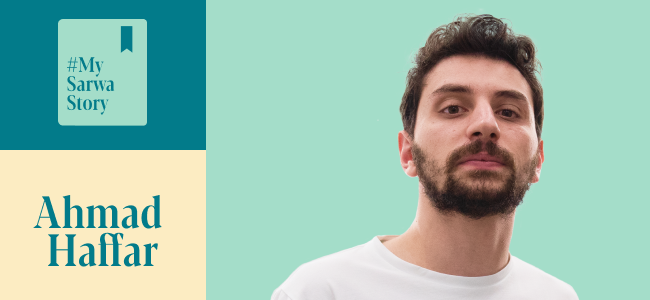In this episode of #MySarwa story, we sit down with Ahmad Haffar – a renowned Lebanese-born voice over artist who is better known as the Voice of Dubai. You might think this nickname sounds very ambitious – but that’s what Ahmad is all about. After all, anywhere you go in Dubai, you are unknowingly guided by his voice – from the airport, Emirates Airlines, and Dubai metro to Vox Cinema, the Opera and, most recently, EXPO. Ahmad is not only one of the most hired voice talents in the UAE, but is a composer of short jingles for e-com companies like DU and Etisalat. He is also a co-founder of Mindloop sound studio, where upcoming voice over artists come to polish their skills and get some advice from the industry expert. And now, when he finally revealed the face behind the famous voice, he is
Ahmad comes off as confident, goofy, and extravagant. He likes to “buy things” (quite expensive things) – like a Lotus or generous gifts for close friends and family. Ahmad enjoys the process of treating his friends but he doesn’t view an expensive car as something that defines a person, but rather as a fun hobby. “Yes, I am egoistic [sic]. Try to drive a Ferrari and not be egoistic,” Ahmad says with casual flair. “But they [cars] don’t make you who you are.”
“Your goal shouldn’t be to buy a Ferrari. Your goal should be to make two million dollars and buy two Ferraris for fun. For fun!” Ahmad adds, waving his hands. “They will not change your life and they won’t make you who you are.”
But Ahmad hasn’t always been surrounded with these things. He didn’t grow up in a privileged environment – he was a street-smart kid, who dropped out of school to make money off of random music gigs as a teenager, and learned how to stand for himself from an early age. He developed confidence while networking grew his career. He learned from a young age how to multiply the money he had, and what steps to take to make a one-hundred dollar bill into something more. Ahmad is also the sole survivor of a deadly car accident, having resurrected from a month-long coma. He says the accident – the loss of his best friends and a traumatic recovery process – changed his approach to life, and pushed him to chase his dreams in Dubai.
For now, Ahmad just enjoys doing what he loves and making income off of that – and then buying stuff, of course. He hasn’t yet thought of a long-term investment strategy. Though, he did buy a house, as well as expensive cars – which, turns out, can also be assets, not just toys.
Plug in your headphones and watch the full interview on our YouTube page, or if you’re on-the-go you can listen to it on your favorite podcast streaming platform (such as Apple Podcasts, Spotify, or Anghami).
